PMS Bazaar recently organized a webinar titled “Outperforming During Market Drawdowns” which featured Mr. Rishab Nahar, Partner and Fund Manager, Qode Advisors LLP. This blog covers the important points shared in this insightful webinar.
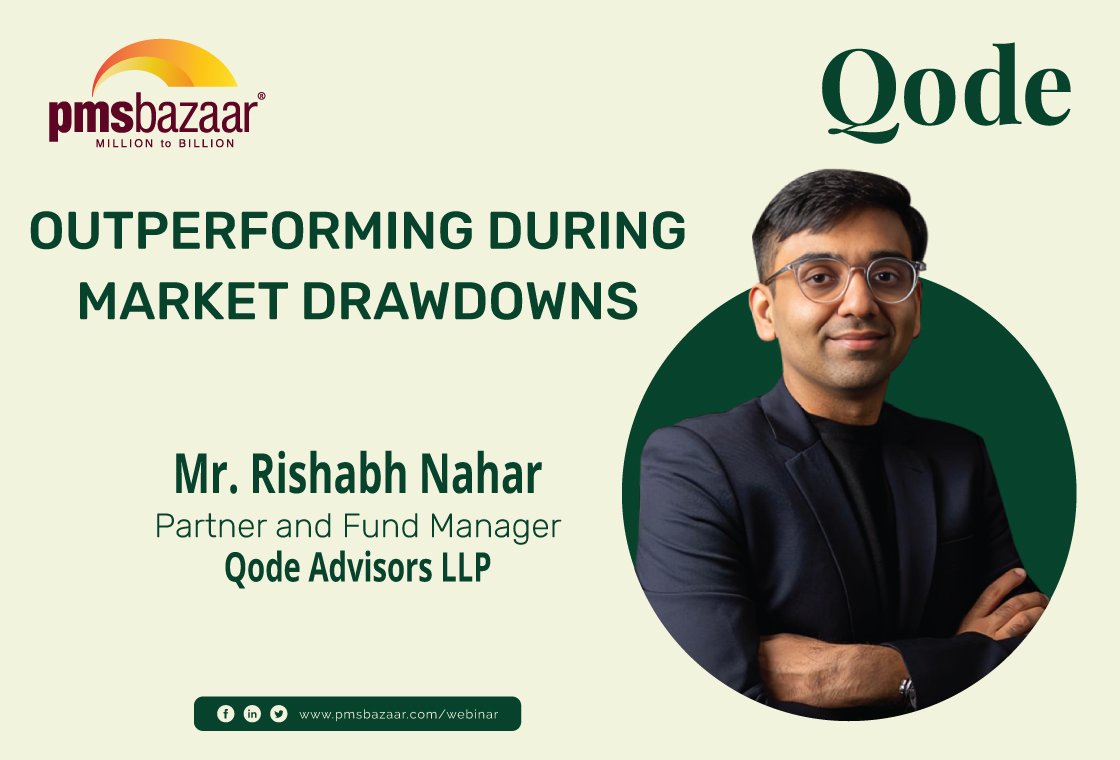
The webinar blog covers insights from Mr. Nahar, which includes, his shift from subjective investing to founding Qode, a quant-driven investment firm. It highlights the firm’s systematic, rules-based approach, portfolio diversification, dynamic hedging, and focus on earnings growth. Nahar explains how quant investing reduces emotion and luck, enforces discipline, and ensures consistent returns, while emphasising human oversight in designing and monitoring models for long-term wealth creation.
Key aspects covered in this webinar blog are
- From subjective investing to quant-based decision making
- The core philosophy of quant investing
- Diversification and portfolio protection
- The anti-fragility of a quant-driven portfolio
- The dynamic nature of hedging
- Beyond data: the "why" of a quant model
- Global reach and strategic vision
- A human touch in a rules-based world
Mr. Rishabh Nahar started by offering insights into his professional journey, the founding of Qode Advisors, and the core philosophy of quant investing. He began by recounting his background as a subjective investor before 2016, a period during which he meticulously analysed over 70 businesses by meeting with management and visiting factories. This traditional, hands-on approach to stock selection, he explained, was a cornerstone of his early career.
From Subjective Investing to Quant-Based Decision Making
Mr. Nahar shared that his transition began in 2016 when he decided to start something on his own. This was the genesis of Qode, though the firm began managing external capital in 2018. He revealed that the initial idea for Qode was never to manage funds for others, but rather to satisfy a personal curiosity: could they develop a different approach to investing that wasn’t at the mercy of market whims or subjective biases? He stated that he and his three partners, Karan, Kavan, and Gaurav, are all naturally data-driven and systematic in their thinking. Together, they manage the various facets of the business, including research, operations, compliance, and execution, with a strong emphasis on technology. He emphasized that the firm is a "pure quant firm" that makes only objective decisions, a direct contrast to his previous subjective style.
Mr. Nahar acknowledged that the financial markets are often filled with investing based on "gut feeling," and his firm's mission was to reduce the role of luck in investment outcomes. He explained that investors frequently look at past returns, which can be misleading, as those returns might be due to one or two stocks that happened to perform well, making it difficult to differentiate between luck and skill. He stressed that while luck will always be a factor, the goal of quant investing is to minimize its influence and create a more repeatable, systematic process. To achieve this, he and his partners spent two years, from 2016 to 2018, learning to code and back-testing numerous strategies.
The Core Philosophy of Quant Investing
Dispelling common misconceptions, Mr. Nahar clarified that quant investing is not a "black box" where a mysterious algorithm spits out stock recommendations. Instead, he described it as a systematic framework of rules and thought processes based on an investor's experience and discipline. He drew a parallel to a distinguished investor like Warren Buffett, who has a steadfast rule of not investing in tech stocks. The power of quant investing, he asserted, lies in its ability to enforce this kind of discipline and remove biases and emotions. He recalled his own experience as a subjective investor, noting that he could be swayed by a charismatic CEO, even if the underlying business was weak. In contrast, quant models focus on objective metrics; a good CEO's performance, he argued, will be reflected in the company's financial numbers and other quantifiable metrics.
He also emphasized that the firm's role as fund managers is to define and test these rules, and then to stick to them consistently. The ultimate goal, he said, is not to find patterns but to apply first principles of investing in a disciplined manner. He noted that the long-term price of a stock will eventually converge with its earnings, so the fundamental premise of their work is to identify businesses with strong EPS (earnings per share) growth.
Diversification and Portfolio Protection
A significant portion of the conversation was dedicated to two key principles: diversification over market timing and the protection layer. Mr. Nahar pointed out that different asset classes perform differently over time, and he cited the work of Ray Dalio, an investor known for his focus on having multiple uncorrelated asset classes. He stated that combining various asset classes, such as equities and gold, can produce a much smoother equity curve for investors, helping them avoid the emotional pain of large drawdowns.
He presented a compelling case study: while the Nifty 50 had an 11% long-term return with a 38-39% drawdown in 2020, a simple portfolio combining a momentum ETF, a low volatility ETF, and gold could achieve a 20% return with a much lower drawdown of 23%. He further explained that adding a layer of dynamic hedging, through the use of put options, could dramatically reduce the drawdown even more. This approach, he noted, avoids the "double whammy" of a cash call, which creates a tax event and risks missing out on a subsequent market rally. He likened the put option to buying "term insurance" for the portfolio, which allows the firm to protect against significant losses without exiting the market entirely. He said this is the philosophy behind their "Qode All-Weather Portfolio," which he claims has consistently outperformed the Nifty with a fraction of the risk.
The Anti-Fragility of a Quant-Driven Portfolio
Mr. Nahar addressed the common notion that higher returns require higher risk. He asserted that this is a myth, stating that his firm's live portfolio returns demonstrate that wealth creation is possible without enduring significant pain. He explained that their strategy of holding small and mid-cap stocks while simultaneously using portfolio hedging and a gold allocation acts as a cushion, allowing them to participate in growth while mitigating drawdowns. He offered a clear example: a portfolio that earns 30% for four years but then sees a 30% drawdown in the fifth year will have a significantly lower CAGR than a portfolio that earns consistently and avoids the drawdown entirely.
He also shared his views on why a rules-driven framework can be more effective than discretionary stock picking. While acknowledging the skill of many active fund managers, he emphasized the human element of emotion and the potential for a fund manager's bad day to affect investment decisions. He stated that a rules-driven system provides consistency and removes human fallibility, offering investors the assurance that the promised process will be followed for years to come. Ultimately, he sees quant investing as a way to make the investment journey smoother and less anxiety-inducing. He also believes that his firm's edge lies in its commitment to first principles and a deep understanding of market dynamics, which allows them to create strategies that are resilient across different market cycles.
The Dynamic Nature of Hedging
Mr. Nahar explained that Qode never takes a cash call, even when anticipating market downturns. Instead, they utilize a dynamic hedging strategy, primarily with put options. He clarified that this is not a subjective decision based on a fund manager's view of market valuation, but a purely systematic, rules-based process. The key, he said, is to have a predictive model that determines when to apply the hedge and for how long, as holding a hedge for an extended period can be very costly. This approach, he noted, has been developed and refined through years of experience, ensuring a consistent and disciplined framework. He also confirmed that they only hedge using index options to manage liquidity concerns, accepting that this provides protection for a portion of the portfolio rather than the entire thing.
Beyond Data: The "Why" of a Quant Model
When asked about model decay, he argued that it is less of a concern for a model rooted in earnings growth. He distinguished this from models that merely rely on data overfitting. He stated that a truly robust model is based on timeless principles, such as identifying businesses with great capital allocators and strong execution capabilities. If a quant fund manager isn't questioning why a backtest showed good returns, he said, they are at risk of a model that will decay without them realizing it. Mr. Nahar emphasized that at Qode, they always link their quantitative models back to the fundamental premise that a stock's long-term price will follow its earnings.
Global Reach and Strategic Vision
Mr. Nahar shared that the firm's recent expansion into GIFT City was a strategic move to access a broader range of global assets and geographies. He explained that while the long-term future of India looks promising, it is prudent to diversify internationally, offering investors exposure to potential wealth creation in other countries. He reiterated that Qode's vision is not driven by business targets or a desire for a specific AUM, but by a passion for continuous research. He summed up the firm's core philosophy as: "do good research," with any new fund or expansion emerging organically from their findings.
A Human Touch in a Rules-Based World
Addressing the question of whether a first-time investor should trust a human or a "machine," Mr. Nahar challenged the premise. He stated that the "machine" is not an independent entity, but a reflection of the rules and intelligence that humans have put into place. He likened it to a set of pre-defined rules, such as investing in businesses with specific characteristics—like promoters in a certain age range or strong working capital ratios—that ultimately lead to a stock selection. Therefore, he argued, it's not a choice between a human and a machine, but about trusting a disciplined, systematic framework that is ultimately created and overseen by humans.
Mr. Nahar covered all the topics mentioned above in-depth and answered questions from the audience towards the end of the session. For more such insights on this webinar, watch the recording of this insightful session through the appended link below.
Get access to rich data and analytics of PMS & AIF by subscribing to us. Join the 75000+ investors & experts: Subscribe NOW
Recent Blogs

January Rout, Extreme Dispersion: PMS Returns Swing From Losses to Gains
Benchmark falls deepened losses, but multi-asset and debt cushioned portfolios meaningfully
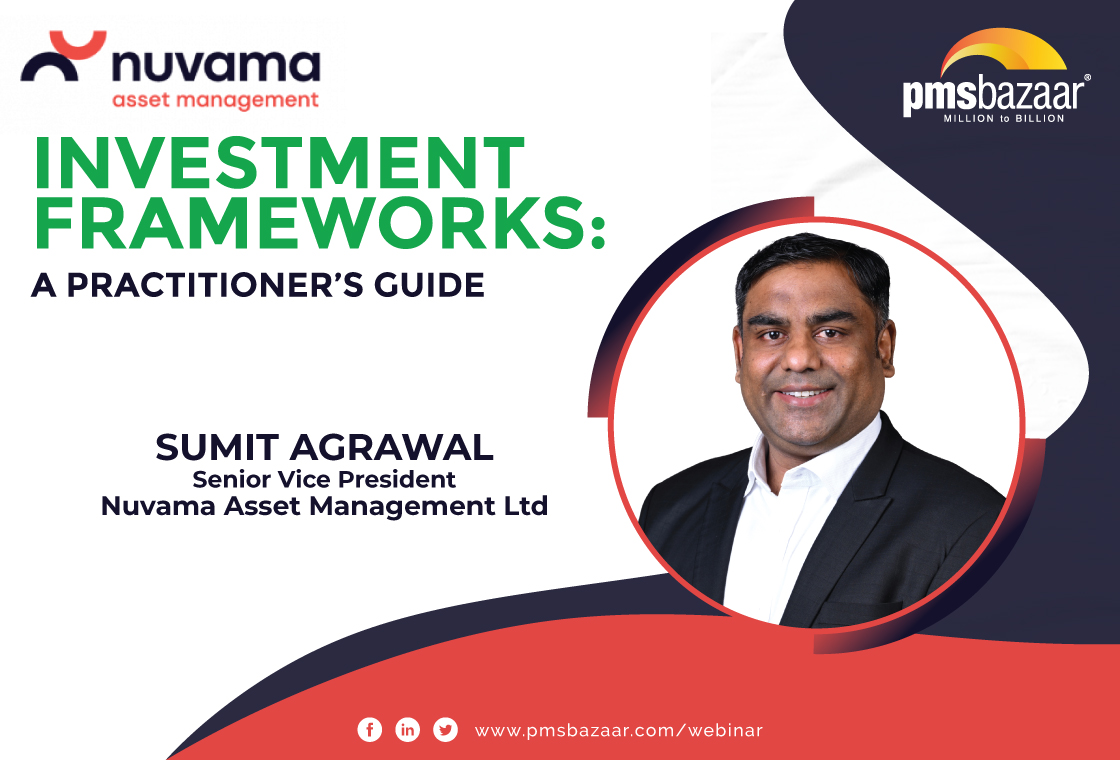
Investment Frameworks : A Practitioner’s Guide
PMS Bazaar recently organized a webinar titled “Investment Frameworks: A Practitioner’s Guide,” which featured Mr. Sumit Agrawal, Senior Vice President, Nuvama Asset Management Limited. This blog covers the important points shared in this insightful webinar.
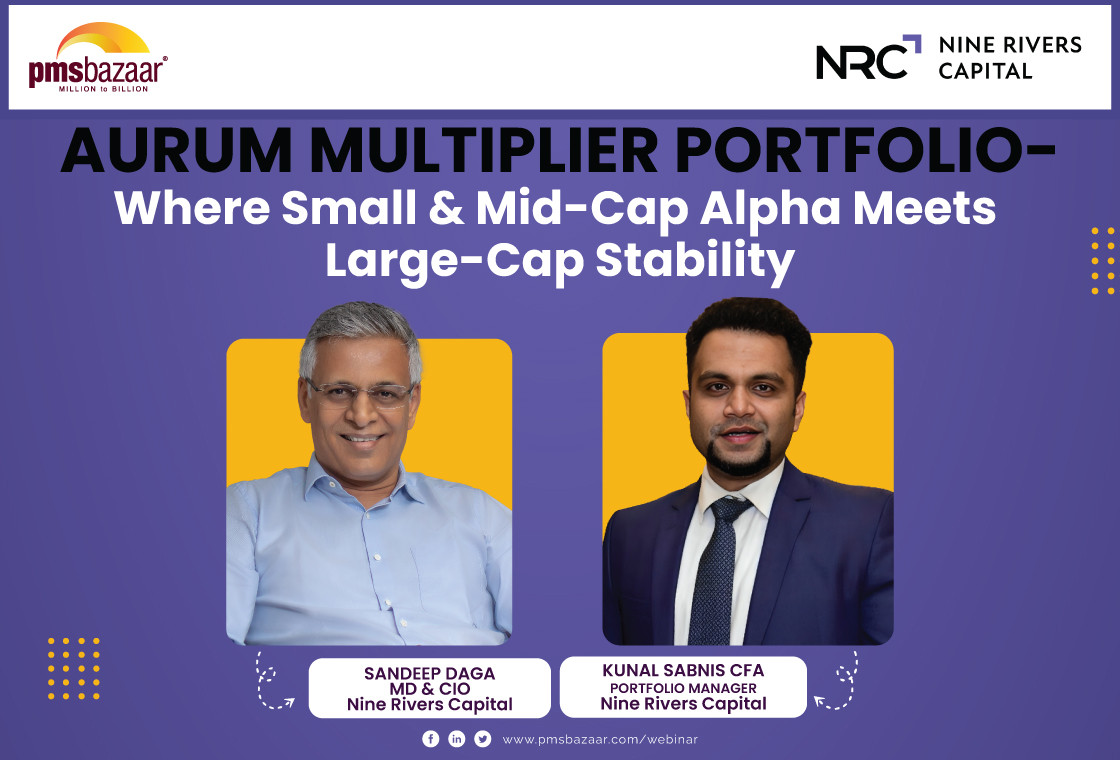
Aurum Multiplier Portfolio - Where Small and Mid-Cap Alpha Meets Large-Cap Stability
PMS Bazaar recently organized a webinar titled “Aurum Multiplier Portfolio - Where Small and Mid-Cap Alpha Meets Large-Cap Stability,” which featured Mr. Sandeep Daga, MD& CIO, Nine Rivers Capital and Mr. Kunal Sabnis, Portfolio Manager, Nine Rivers Capital. This blog covers the important points shared in this insightful webinar.

Flat Markets, Wide Outcomes: How 484 PMS Strategies Performed in Dec 2025
December 2025 was a month where market returns stayed close to flat, with the Nifty 50 TRI at -0.28% and the BSE 500 TRI at -0.24%.
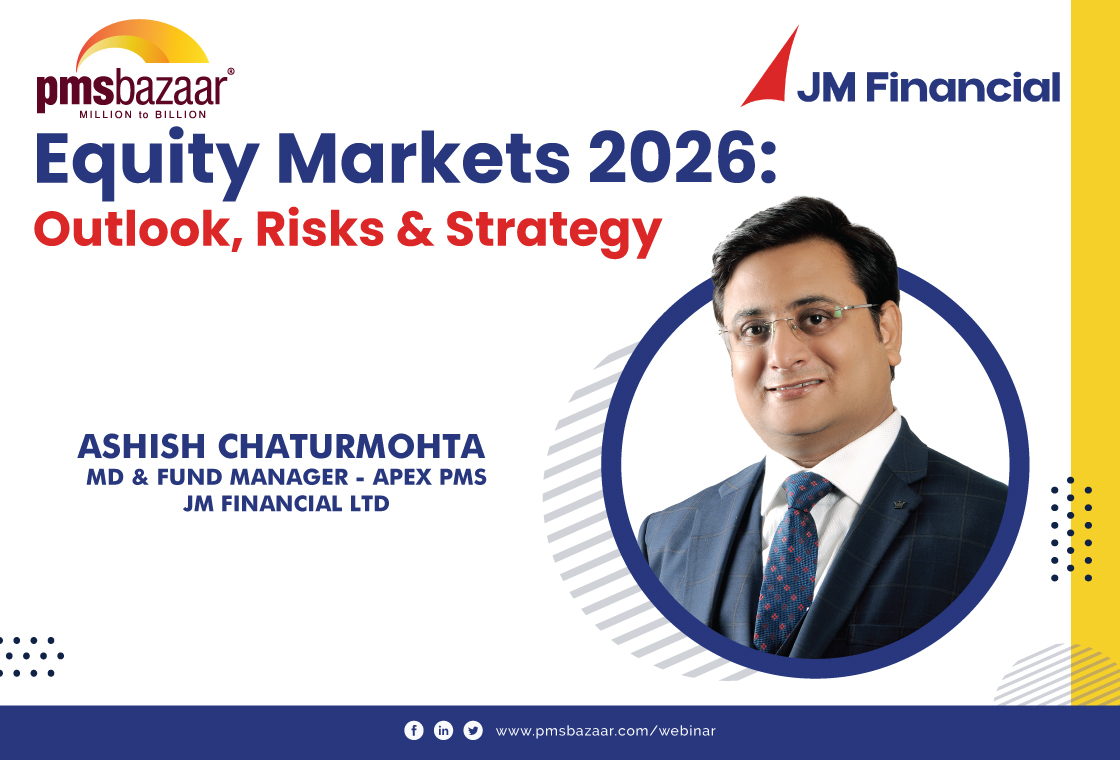
Equity Markets 2026: Outlook, Risks and Strategy
PMS Bazaar recently organized a webinar titled “Equity Markets 2026: Outlook, Risks and Strategy,” which featured Mr. Ashish Chaturmohta, MD & Fund Manager – APEX PMS, JM Financial Limited. This blog covers the important points shared in this insightful webinar.

MICRO CAPS: The Dark Horses of the Indian Equity Market
PMS Bazaar recently organized a webinar titled “MICRO CAPS: The Dark Horses of the Indian Equity Market,” which featured Mr. Rishi Agarwal and Mr. Adheesh Kabra, both Co-Founders and Fund Managers, Aarth AIF. This blog covers the important points shared in this insightful webinar.
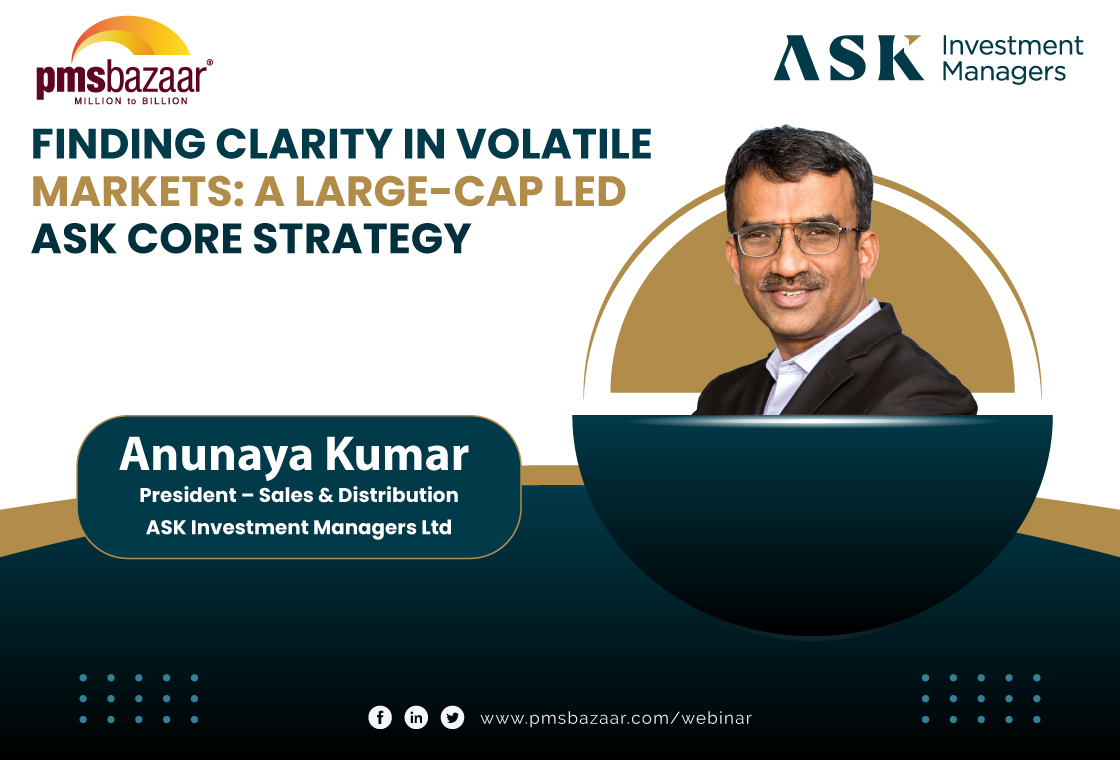
Finding Clarity in Volatile Markets: A Large-Cap Led ASK CORE Strategy
PMS Bazaar recently organized a webinar titled “Finding Clarity in Volatile Markets: A Large-Cap Led ASK CORE Strategy,” which featured Mr.Anunaya Kumar, President – Sales and Distribution ASK Investment Managers Limited. This blog covers the important points shared in this insightful webinar.
.jpg)
Passively Active Investing — A Modern Investor’s Lens on ETF-Based PMS
PMS Bazaar recently organized a webinar titled “Passively Active Investing — A Modern Investor’s Lens on ETF-Based PMS,” which featured Mr. Karan Bhatia, Co-Founder and Co-Fund Manager , Pricebridge Honeycomb ETF PMs. This blog covers the important points shared in this insightful webinar.

